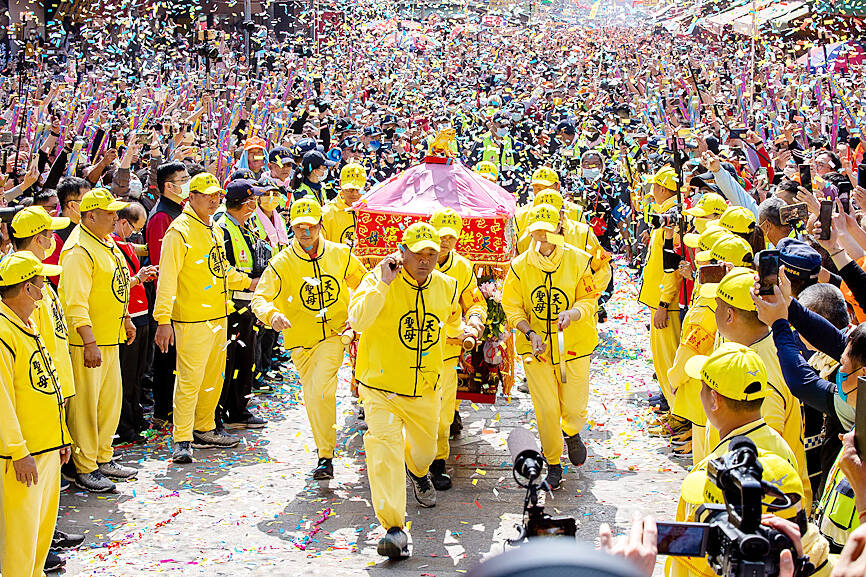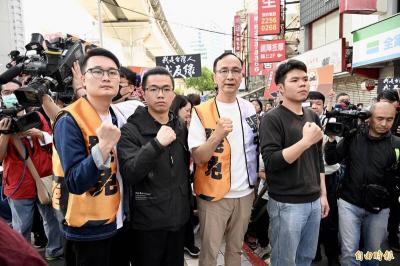People taking part in Matsu pilgrimages should take steps to protect their health during the long trip on foot, a doctor said.
Temples dedicated to the sea goddess Matsu traditionally hold pilgrimages in the third lunar month to mark her birthday on the 23rd day, with worshipers walking long distances to pray for blessings.
Lin Chia-chia (林佳佳), director of the Family Medicine Department at Taichung Tzu Chi Hospital, said proper health precautions are essential, as participants often face extended walking, disrupted sleep and large crowds — all of which can strain the body.

Photo courtesy of Beigang Chaotian Temple
Blisters, muscle strain and joint pain are common issues, so wearing breathable, well-fitting socks and comfortable shoes is highly recommended, she said.
Shoe soles should not be overly rigid or worn out, as this can increase the risk of injury, she said.
Using kinesiology tape on the legs or soles of the feet, as well as wearing knee pads, can help reduce walking-related strain, she added.
If blisters form, they should be disinfected with alcohol or saline solution and covered with gauze to prevent friction or infection — they should not be popped or torn off, she said.
As pilgrimages involve long hours and distances, alternating temperatures between day and night might cause heatstroke or illnesses such as colds, Lin said, urging participants to rest in shaded areas whenever possible to avoid excessive sun exposure and to drink plenty of water.
Burning firecrackers or incense produces particles carried by the smoke that would stimulate the respiratory tract, inducing coughing or dyspnea in people with allergies or asthma, she said.
Therefore, pilgrimage participants are advised to wear a mask and those with an allergic constitution should bring allergy medication with them, she added.
The risk of gastroenteritis and other transmissible diseases is higher during pilgrimages, as dining and lodging conditions vary widely and might lack proper sanitation, Lin said.
Participants should bring alcohol-based hand sanitizer and practice frequent handwashing, especially before meals, she said.
Elderly people or those with chronic diseases — particularly those with cardiovascular diseases — should take extra precautions, as long walks could result in increased blood pressure, heart attacks or strokes, Lin said.
Participants with chronic diseases must remember to bring their medication and adhere to their prescribed schedules, she said.
If symptoms such as dizziness or chest pain occur, it is crucial to rest immediately and seek medical attention, Lin said.
Physical health is just as important as personal faith, and people should honestly assess their health before embarking on a pilgrimage, she said.
Participants should seek help from medical stations along the route whenever they feel ill to prevent regrettable consequences, Lin added.

The Ministry of Economic Affairs has fined Taobao NT$1.2 million (US$36,900) for advertisements that exceeded its approved business scope and ordered the Chinese e-commerce platform to make corrections in the first half of this year or its license would be revoked. Lawmakers have called for stricter supervision of Chinese e-commerce platforms and more stringent measures to prevent China from laundering its goods through Taiwan as US President Donald Trump’s administration cracks down on origin laundering. The legislature’s Finance Committee yesterday met to discuss policies to prevent China from dumping goods in Taiwan, inviting government agencies to report on the matter. Democratic Progressive Party

Taiwan and its Pacific ally Tuvalu on Tuesday signed two accords aimed at facilitating bilateral cooperation on labor affairs, according to Taiwan’s Ministry of Foreign Affairs (MOFA). The governments inked two agreements in Taipei, witnessed by Foreign Minister Lin Chia-lung (林佳龍) and visiting Deputy Tuvaluan Prime Minister Panapasi Nelesone, MOFA said in a news release. According to MOFA, the agreements will facilitate cooperation on labor issues and allow the two sides to mutually recognize seafarers’ certificates and related training. Taiwan would also continue to collaborate with Tuvalu across various fields to promote economic prosperity as well as the well-being of their

The Taipei District Prosecutors’ Office has continued its investigation into allegations of forged signatures in recall efforts today by searching the Chinese Nationalist Party’s (KMT) city chapter and questioning several personnel including the chapter director, according to media reports. Among those questioned and detained were KMT Taipei chapter director Huang Lu Chin-ju (黃呂錦茹), chapter secretary-general Chu Wen-ching (初文卿), chapter secretary Yao Fu-wen (姚富文) and first district committee executive director Tseng Fan-chuan (曾繁川). Prosecutors said they would not confirm reports about who had been summoned. The investigation centers on allegations that the ongoing recall campaigns targeting Democratic Progressive Party legislators Rosalia Wu (吳思瑤)

Taiwan would welcome the return of Honduras as a diplomatic ally if its next president decides to make such a move, Minister of Foreign Affairs Lin Chia-lung (林佳龍) said yesterday. “Of course, we would welcome Honduras if they want to restore diplomatic ties with Taiwan after their elections,” Lin said at a meeting of the legislature’s Foreign Affairs and National Defense Committee, when asked to comment on statements made by two of the three Honduran presidential candidates during the presidential campaign in the Central American country. Taiwan is paying close attention to the region as a whole in the wake of a